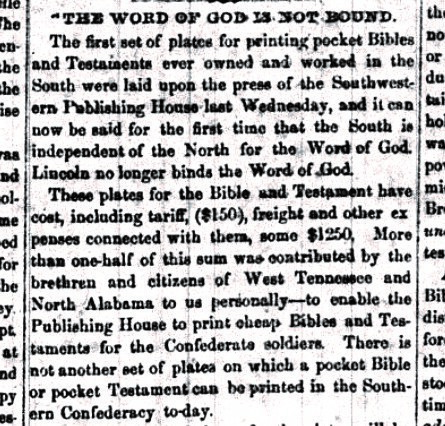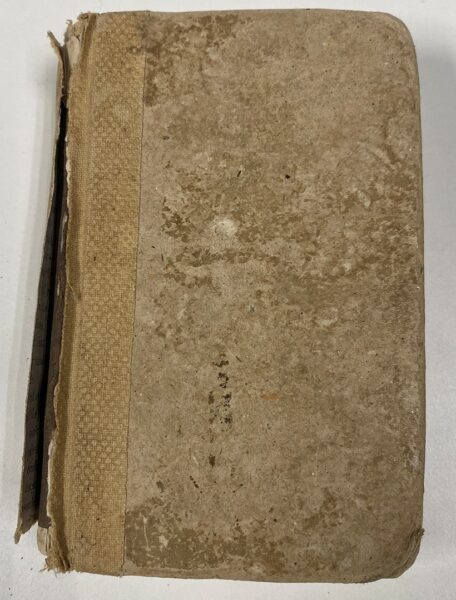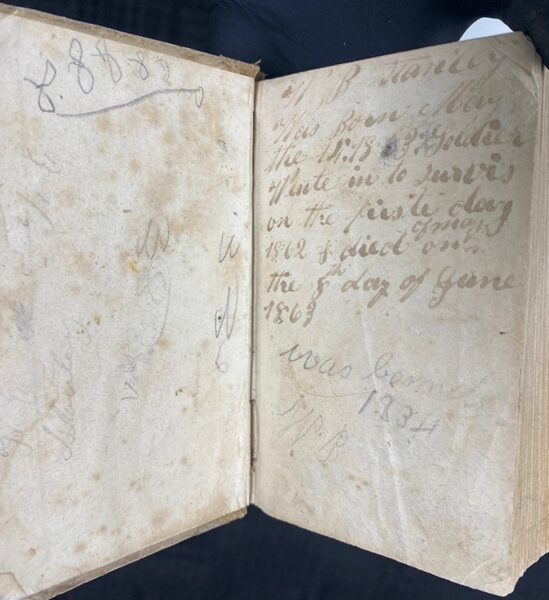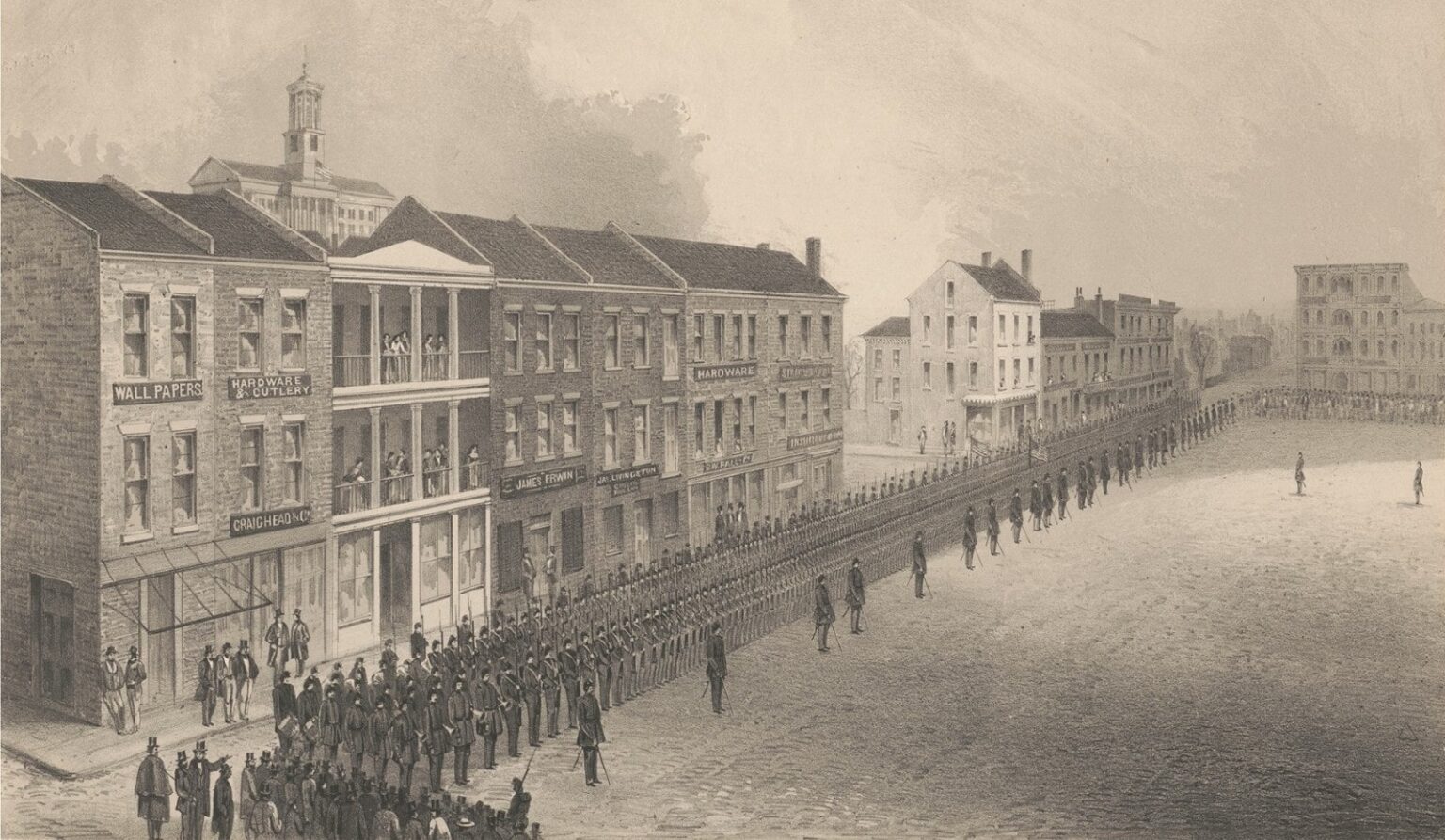Southwestern Publishing House, a Community Initiative, and One Soldier’s Story
From the Southwestern Archives
Conflict Between the North and South Leads to Civil War
Tension over opposing viewpoints had been mounting between the North and South in America in the first half of the 19th century. Civil war was looming while J.R. Graves and Southwestern Publishing House had set up shop on Market Street. In early 1861, conflict in the states erupted, the Confederacy was formed, and the Civil War began. The war lasted four years and more than 650,000 lives were lost. The battle resulted in the emancipation of more than 3.9 million enslaved Black Americans and shaped our nation in a myriad of ways.
J.R. Graves Finds a Solution to Printing Bibles for the Soldiers in the South
After the war broke out, pocket Bibles quickly became scarce in the Confederacy. They had exclusively been printed in northern states and the South was cut off from resources coming from the Union. Graves not only felt a duty to support soldiers through the “word of God,” but felt an unrelenting drive to do his part. He was committed to ensuring that any soldier on the battlefield have access to a Bible if they so desired and their small size made it easier for soldiers to carry with them. Southwestern Publishing House had the audience and reach to raise funds to purchase the stereotype plates and the cutting-edge equipment to print them in bulk quantities. The only issue was that the plates would have to smuggled through enemy lines from Philadelphia. Graves had a contact to procure them and after successfully raising the funds came up with a plan to bring them back by way of Kentucky.

The First Pocket Bible Plates in the South “were laid upon the press of the Southwestern Publishing House” in 1861
Money was raised from churches and individuals for the project and Graves set out to purchase the plates. Anyone who donated to help purchase the plates, received their money back in Bibles and printed material. The Bibles were provided in bulk at cost and could then be distributed by various churches and Bible societies. Nashville was at the center of this new initiative and the Southwestern Publishing House was the first in the South that successfully printed the pocket Bible.
Confederate pocket Bibles are amongst the rarest in collections today. One such example is shown in the display case at Southwestern headquarters in Nashville. It seems it was common practice for a soldier to write their name in their pocket Bible, their date of birth, and date they entered the service. It also seems to have been common practice for families to record their loved one’s death date in the same Bible when it was returned to them after a soldier was lost in battle.

W.B. Stanley, a Soldier from Georgia, Husband to Anna, and Father of Five
William Bitham “W.B.” Stanley was the young soldier who carried the Bible on display in the Landers Plaza display case. He was born in May 1834 in Fayette County, GA and married Anna Thornton in December of 1854. When he enlisted in May 1862, he was in the 22nd Infantry Regiment (Company K) of the Georgia volunteers, he left behind his wife and their five children – Melissa Lee “Lessie,” Roxa, Mary Elizabeth, Frances, and Felix. Like so many other young men, W.B. would not return home or see his family ever again. He was wounded in the Battle of Fredericksburg, VA and was sent to the hospital, where gangrene set in and on June 8, 1863, he died in the hospital from its effects. He was buried in Oakwood Cemetery in Richmond, VA with no headstone. It seems Mrs. Anna Stanley never remarried and raised the children on her own.

Handwriting reads: “W.B. Stanley was born May the 14: 1863: Soldier xxx in to servis on the firste day of May 1862 & died on the 8th day of June 1863” then corrected below “was borned 1834”
The Letters Between a Soldier and his Wife
Through researching W.B., a correspondence was located that is held within the Atlanta Research Center, written during his time served. W.B. and Anna sent correspondence back and forth from June 1862 (one month after enlisting) through April 1863 (two months before his death). The letters provide a glimpse into one family’s devastating experience of a war fought over 160 years ago. Through their personal written records and attempts at connection through an agonizingly slow year and two months, we see almost every aspect of painful human emotion. It is a story of bravery, fear, and sacrifice; a young man’s life cut short leaving behind his wife and children. W.B. begs of Anna to “rite” back as much as she can, while she is hopeful W.B. will be able to spend a small amount of money to have a portrait photo taken to send back to her. You can feel the desperation in their voices as time progresses and empathize with the concern W.B. felt for his wife and children’s wellbeing. Anna describes the state of the home, reporting the crop growth for the season, and details how much Calico fabric she is able to buy for her sewing needs. W.B. sends love and “howdies” to his children from afar and dreams of the day he will be home and buy treats for all of them. The young soldier complains of food shortages while being stationed in Guinea Station, VA. In his last letter, in April 1863, Stanley woefully writes, “I do truly hope it wont be long before this truble times will com to a close for it is hard times heare know & worse a comin I think.”
In Hard Times, a Problem Solved
Solving an injustice during a time of civil unrest and despair was something J.R. Graves took seriously. This, paired with grit and determination, made a difference in the community, the city, and the future of the publishing industry in Nashville. Without his initiative, problem-solving, and risk-taking, southern soldiers might have lost hope sooner than later. The pocket Bible symbolized a small bit of hope that they could turn to when the grisly realities of war set in. The Bibles continued to be published in Nashville until 1862 when the Union army moved in and (eventually) took over the city. Graves, unstoppable, moved his operations to Memphis.
To read the letters, click here. Please note they are hard to read based on the poor spelling capability of both W.B. and Anna.




